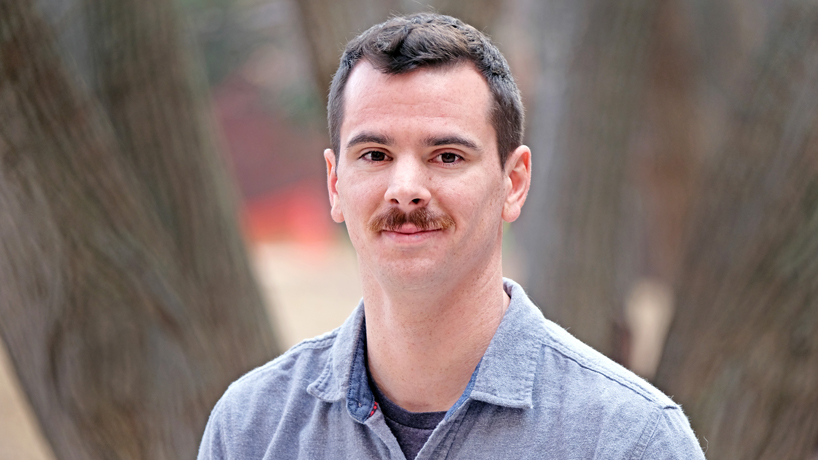
New criminology and criminal justice graduate James Day plans to enroll in the Seasonal Law Enforcement Training Program in Franklin, North Carolina, with the goal of becoming a law enforcement ranger with the National Park Service. (Photo by August Jennewein)
James Day opted not to attend commencement ceremonies last weekend at the University of Missouri–St. Louis.
He figured he’d already walked in one graduation event when earning an associate’s degree in Maine several years ago, and his extended family didn’t intend to make the trek from New England.
“If they were, I definitely would walk, but it’s like, ‘I’ve done it once before. I know what it is,’” he said. “It’d be more just personal recognition, which I don’t necessarily like.”
Besides, Day has been eager to get going on the next phase of his life.
Armed with a bachelor’s in criminology and criminal justice, the 29-year-old Army veteran is moving to Franklin, North Carolina, with his wife, Jackie. He plans to enroll in the Seasonal Law Enforcement Training Program at Southwestern Community College.
It is one of seven such programs across the country specifically designed to prepare people for jobs as law enforcement rangers with the National Park Service.
Program participants complete 650 classroom hours during the 17-week academy. They also have to pass drug, medical and background screenings and meet physical fitness standards, but after graduating from the program, they’re eligible to apply for seasonal positions with the National Park Service.
New hires typically work two or three years in seasonal jobs before securing permanent placements at one of the National Park Services’ more than 400 sites nationwide.
Day’s interest in becoming a park ranger fits with how he prefers to spend his free time.
“I’ve always been someone who likes being outdoors, being more active – biking and hockey,” Day said. “It’s just relaxing, I guess. It’s not mental work, it’s more physical work.”
He was able to find ample opportunities growing up, particularly after his family moved from the provincial capital of Fredericton, New Brunswick, to the remote town of West Stewartstown, New Hampshire, not far from where his parents were raised near the borders of Vermont to the west and Canada to the north.
But Day didn’t actively seek a job in the outdoors when he graduated from high school. Instead, he enrolled at Northern Maine Community College and earned an associate’s degree in plumbing and heating.
He later enlisted in the U.S. Army and, after going through training, got assigned to a unit stationed at Fort Leonard Wood in the Missouri Ozarks.
Day served nearly four years in the Army. His unit was being deployed in 2013, so he had to decide if he would re-enlist and head overseas or separate early. He briefly considered staying and trying to make a career in the military but ultimately chose civilian life instead and returned home to New Hampshire.
He would not stay there long, however.
Day began thinking about potential careers, ones that would allow him to be active and outdoors. He thought about becoming a park ranger – though at that point he’d never had the opportunity to visit a national park – and began investigating what kind of credentials he’d need to make it happen.
That’s what prompted his decision to take advantage of the GI Bill, go back to school and pursue a degree in criminology and criminal justice.
“With USA Jobs, they give a list of all degrees that would fulfill the requirement to get the job,” he said. “When I looked at the list, this is one of the broadest ones that I could get that could apply to multiple things. Not necessarily that I might want to, but I could fall back into the prison system, I could get into local law enforcement. I felt like it was much broader than like a parks management degree.”
His decision to choose UMSL had as much to do with the fact he already had friends in the St. Louis area that he’d made during his time at Fort Leonard Wood as it did the criminology and criminal justice department’s strong national reputation.
Day appreciated many of the courses and professors he had working toward his major, including three taught by Associate Professor Terrance J. Taylor.
He also admired Jim Craig, associate teaching professor and chair of the Department of Military and Veterans Studies, who taught his veterans transition class, another course on veterans in America and oversaw an independent study course.
“He’s extremely helpful,” Day said. “Just other advice apart from the class that he gives is amazing.”
The UMSL Veterans Center also proved a welcome place to spend time in between classes and interact with other students who had similar life experiences and often shared his sense of humor.
Day readily admits he’s seen school mostly as a means to an end. But his time at UMSL has served that purpose and positioned him to reach his goals.















